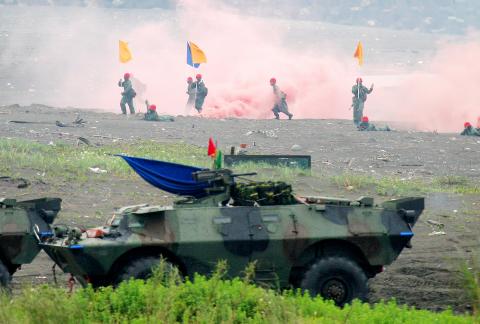President Ma Ying-jeou (馬英九) yesterday came under fire for his failure to participate as commander-in-chief in the Han Kuang series of military exercises, making him the first president in 28 years to fail to do so.
Ma is on a 12-day visit to Africa to visit three of Taiwan’s diplomatic allies.
Democratic Progressive Party (DPP) Legislator Huang Wei-cher (黃偉哲) led the charge, saying the annual exercises were seen as an actual military operation.

Photo: CNA
As commander-in-chief, Ma is disregarding his supreme command authority by failing to attend the exercise, Huang said.
Responding to the criticism, the Ministry of National Defense said the Presidential Office and the Ministry of Foreign Affairs had an advance schedule of Ma’s visits to the country’s diplomatic allies, and that those happened to coincide with the Han Kuang exercises.
Ministry spokesperson Colonel David Lo (羅紹和) said that before Ma embarked on his trip to Africa, the ministry had briefed him in a routine meeting on the scheduled details of the military exercise, adding that Ma was thoroughly clear on the war games.
Although Ma could not attend this year’s Han Kuang exercises, he inspected Hengshan Command Headquarters on several military exercises in the past to gain a better understanding of the war games, Lo said.
The idea that Ma does not care about national defense is a public misconception, Lo said.
However, aside from his absence in this year’s Han Kuang exercises, Ma only made one public appearance at the Lien Yung military exercises and only attended one joint air defense live-fire exercise since he took office in 2008.
The exercises began yesterday and run through Friday, during which military personnel will practice simulated invasions by Chinese forces and round-the-clock attack-defense simulations.
The ministry said thousands of troops would participate in the maneuvers at air bases and along the coasts. The drills are aimed at defending against Chinese troop landings and air attacks, but for the third year in a row, they do not involve live fire.
Before Ma took office four years ago, the Han Kuang exercises were a live-fire extravaganza, featuring coordinated air, naval and land -responses by Taiwanese forces to a simulated attack by China.
This year’s drills place new emphasis on fending off unmanned aerial vehicles that are believed to have become a major cost--cutting part of the Chinese military strategy.
Taiwan believes any Chinese air attack would increasingly involve the use of drones, a new wrinkle in Beijing’s military posture meant to economize on troop and war plane deployment. The Taiwanese military believes the drones would concentrate on neutralizing radar installations in the event of a conflict.
Meanwhile, four warships from Russia’s Pacific Fleet, as well as support vessels, aircraft, helicopters and naval infantry, left Vladivostok on Sunday en route to the Yellow Sea, where they will engage in joint exercises with the Chinese navy.
The guided missile cruiser Varyag, the Marshal Shaposhnikov, Admiral Panteleyev and Admiral Vinogradov are expected to arrive in China on Sunday for the exercise, which will begin that day and run through April 27.
Additional reporting by AP and J. Michael Cole,ith translation by Stacy Hsu, Staff Writer

NATIONAL SECURITY THREAT: An official said that Guan Guan’s comments had gone beyond the threshold of free speech, as she advocated for the destruction of the ROC China-born media influencer Guan Guan’s (關關) residency permit has been revoked for repeatedly posting pro-China content that threatens national security, the National Immigration Agency said yesterday. Guan Guan has said many controversial things in her videos posted to Douyin (抖音), including “the red flag will soon be painted all over Taiwan” and “Taiwan is an inseparable part of China,” while expressing hope for expedited “reunification.” The agency received multiple reports alleging that Guan Guan had advocated for armed reunification last year. After investigating, the agency last month issued a notice requiring her to appear and account for her actions. Guan Guan appeared as required,

Japan and the Philippines yesterday signed a defense pact that would allow the tax-free provision of ammunition, fuel, food and other necessities when their forces stage joint training to boost deterrence against China’s growing aggression in the region and to bolster their preparation for natural disasters. Japan has faced increasing political, trade and security tensions with China, which was angered by Japanese Prime Minister Sanae Takaichi’s remark that a Chinese attack on Taiwan would be a survival-threatening situation for Japan, triggering a military response. Japan and the Philippines have also had separate territorial conflicts with Beijing in the East and South China

A strong cold air mass is expected to arrive tonight, bringing a change in weather and a drop in temperature, the Central Weather Administration (CWA) said. The coldest time would be early on Thursday morning, with temperatures in some areas dipping as low as 8°C, it said. Daytime highs yesterday were 22°C to 24°C in northern and eastern Taiwan, and about 25°C to 28°C in the central and southern regions, it said. However, nighttime lows would dip to about 15°C to 16°C in central and northern Taiwan as well as the northeast, and 17°C to 19°C elsewhere, it said. Tropical Storm Nokaen, currently

PAPERS, PLEASE: The gang exploited the high value of the passports, selling them at inflated prices to Chinese buyers, who would treat them as ‘invisibility cloaks’ The Yilan District Court has handed four members of a syndicate prison terms ranging from one year and two months to two years and two months for their involvement in a scheme to purchase Taiwanese passports and resell them abroad at a massive markup. A Chinese human smuggling syndicate purchased Taiwanese passports through local criminal networks, exploiting the passports’ visa-free travel privileges to turn a profit of more than 20 times the original price, the court said. Such criminal organizations enable people to impersonate Taiwanese when entering and exiting Taiwan and other countries, undermining social order and the credibility of the nation’s